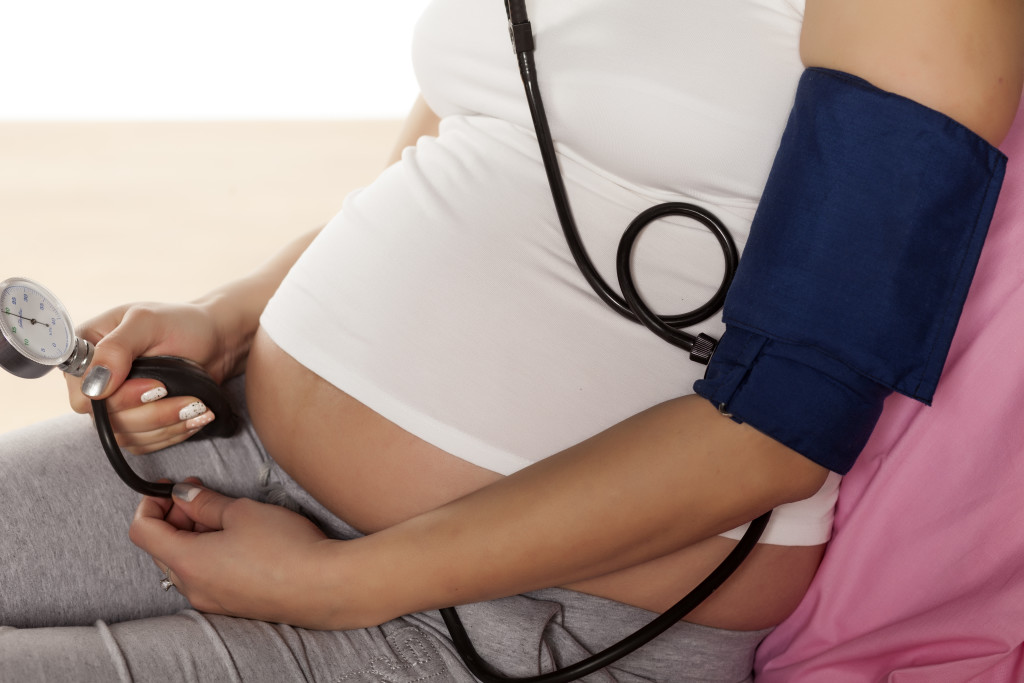 During pregnancy women experience a wide range of physical changes and sensations. The signs of preeclampsia, a disorder that occurs only during pregnancy and the postpartum period, are too often misinterpreted as the symptoms of a normal pregnancy. Preeclampsia generally occurs late in the second or third trimesters, and up to six weeks postpartum. In rare cases it can occur before the second trimester begins. It is estimated that approximately three to five percent of pregnant women suffer from preeclampsia. Globally, preeclampsia and other hypertensive disorders of pregnancy are responsible for 76,000 maternal and 500,000 infant deaths every year. The symptoms can progress rapidly, and in the most severe cases, the results can be fatal. Understanding the signs of this dangerous condition will help keep you and your baby safe.
During pregnancy women experience a wide range of physical changes and sensations. The signs of preeclampsia, a disorder that occurs only during pregnancy and the postpartum period, are too often misinterpreted as the symptoms of a normal pregnancy. Preeclampsia generally occurs late in the second or third trimesters, and up to six weeks postpartum. In rare cases it can occur before the second trimester begins. It is estimated that approximately three to five percent of pregnant women suffer from preeclampsia. Globally, preeclampsia and other hypertensive disorders of pregnancy are responsible for 76,000 maternal and 500,000 infant deaths every year. The symptoms can progress rapidly, and in the most severe cases, the results can be fatal. Understanding the signs of this dangerous condition will help keep you and your baby safe.
Symptoms
Preeclampsia can be particularly dangerous because many of the signs are unidentifiable or misunderstood to be normal effects of pregnancy. Speak with your OBGYN if you experience any of the following:
- High blood pressure (Hypertension). High blood pressure is one of the most important indicators of preeclampsia, however it can easily go unrealized since women cannot feel their blood pressure rising. High blood pressure is generally defined by a reading of 140/90 or greater, measured on two separate occasions six hours apart. During pregnancy, a rise in the lower number of 15 degrees or more, or a rise in the upper number of 30 degrees or more, can be a cause for concern. Your OBGYN will help you keep a record of your blood pressure before and during your pregnancy to help identify an unsafe rise.
- Protein in your urine (Proteinuria). Protein in your urine can occur when proteins that are normally confined to your blood spill into your urine. Preeclampsia temporarily damages the filtering of blood by your kidneys, which causes the leakage of proteins into your urine. To identify this symptom, your OBGYN will test your urine at each prenatal check-up. In between visits if your urine appears to look dark, reddish, or the color of cola, contact your OBGYN immediately.
- Changes in vision. Vision changes are one of the most serious symptoms of preeclampsia. It may be an indication of irritation of the central nervous system or swelling of the brain (cerebral edema). If you experience sensations of flashing lights, auras, light sensitivity, or blurry vision or spots, contact your OBGYN or go directly to the hospital.
- Swelling (Edema). Some swelling is normal and common for pregnant women, however edema is the accumulation of excess fluid that occurs in the face, hands, or around the eyes. Contact your OBGYN if you notice excessive puffiness in your face, hands, or feet. Also, watch for signs of “pitting edema.” When you press your thumb into your skin, if an indentation remains for a few seconds, or you notice discoloration of your legs, you may be experiencing pitting edema and should contact your OBGYN right away.
- Headaches. Severe or dull throbbing headaches that won’t go away could be a sign of preeclampsia. If over-the-counter medicine does not relieve your symptoms, you have light sensitivity, you experiences changes in your vision, or the pain becomes severe, contact your OBGYN.
- Nausea or vomiting. Many women experience morning sickness, however nausea or vomiting that is sudden, and that occurs after mid-pregnancy could be a sign of preeclampsia.
- Abdominal (epigastric) pain and or shoulder pain. Both abdominal pain and shoulder pain, often called “referred pain” because it radiates from the liver under the right ribs, can be confused with heartburn, gallbladder issues, the flu, indigestion or the baby kicking. If the pain is associated with preeclampsia it will be more severe than the pain experienced with muscle strain. Shoulder pain may feel like you are being deeply pinched along the bra strap, on your neck, or your right side. Such pain could be related to an issue with your liver, so contact your OBGYN immediately if your pain seems abnormal or severe.
- Lower back pain. Again not to be confused with general muscle fatigue, lower back pain that is severe may be an indication of an issue with the liver, especially when accompanied by other signs of preeclampsia.
- Sudden weight gain. Many women are hyper-aware of changes in their weight during pregnancy, especially as they watch their baby bump grow and expand with each month. Rapid weight gain, however, could be a cause for concern. Weight gain of more than two pounds in a week could be an indicator of preeclampsia. The rapid increase could be caused by damaged blood vessels allowing more water to leak into body tissues instead of passing through to the kidneys.
- Hyperreflexia. Hyperreflexia is characterized by reflexes that are so strong that when your knee is tapped by a rubber hammer, your leg bounces back hard. It is typically caused by an overreaction of the involuntary nervous system to stimulation. Your OBGYN will test you for hyperreflexia; otherwise it may be difficult to identify on your own.
- Shortness of breath and anxiety. Having moments of nervousness during pregnancy is common, however women should pay attention to more severe signs of anxiety, such as shortness of breath, a racing pulse, mental confusion, and a heightened sense of anxiety. Contact your OBGYN if these symptoms come on immediately or severely.
Preeclampsia Treatment and Prevention
Proper prenatal care is essential to manage the risk of preeclampsia. Attend all scheduled OBGYN visits to make sure you are getting regular weight checks, blood pressure readings, and urine tests. Maintain a healthy diet full of vitamins, and natural, rather than processed, foods. Most importantly, pay attention to your body. While every feeling you experience may seem sudden and strange, trust your instincts. Any rapid or severe changes or symptoms should be taken seriously.
Never hesitate to contact your OBGYN with questions or concerns. And if you are looking for at top OBGYN group in Western New York, please give our practice of Chouchani, Sayegh and Bagnarello a call today.
More
 Miscarriages are saddening medical occurrences that happen more often than is realized, yet the couples who suffer them rarely speak of their losses. Whether their silence is born out of a fear that the sympathies of others may make the loss more emotionally distressing, or out of a greater fear that a pregnancy may never be possible, miscarriages are often an emotional burden that too many couples bear alone. Such isolation is unnecessary, however, as approximately 10 to 20 percent of known pregnancies end in miscarriage, and as many as 50 percent of pregnancies are miscarried so early that the pregnancy is not even known. Though the early termination of any pregnancy can be heart breaking, couples looking to conceive should take comfort in knowing that they are not to blame or at fault for the loss of their fetus. Understanding the truths and overcoming the misperceptions of miscarriages can give comfort to those recovering from such a loss.
Miscarriages are saddening medical occurrences that happen more often than is realized, yet the couples who suffer them rarely speak of their losses. Whether their silence is born out of a fear that the sympathies of others may make the loss more emotionally distressing, or out of a greater fear that a pregnancy may never be possible, miscarriages are often an emotional burden that too many couples bear alone. Such isolation is unnecessary, however, as approximately 10 to 20 percent of known pregnancies end in miscarriage, and as many as 50 percent of pregnancies are miscarried so early that the pregnancy is not even known. Though the early termination of any pregnancy can be heart breaking, couples looking to conceive should take comfort in knowing that they are not to blame or at fault for the loss of their fetus. Understanding the truths and overcoming the misperceptions of miscarriages can give comfort to those recovering from such a loss.
Timing
The majority of miscarriages occur during the first 13 weeks after conception. Since many women wait to share news of their pregnancy with family and friends until after the first trimester, many of the miscarriages that occur during the first thirteen weeks are often unknown by anyone other than the mother and father.
Truth: A great number of miscarriages occur so early that even the couple is unaware that an embryo had formed.
Causes
Though it is commonly believed that lifting heavy objects, participating in dangerous activities, and long-term stress can cause miscarriages, none of these factors have been proven to be valid risk factors. It is believed that the majority of miscarriages are caused by genetic abnormalities within the embryo that would prevent a baby from fully developing healthily and surviving after birth. About 60 percent of the time, miscarriages occur when the embryo or fetus has an abnormal number of chromosomes. In addition, some illnesses may place a woman at a greater risk for miscarriage, including some viral infections, thyroid disease, and diabetes.
Truth: Fatal genetic errors are not usually caused by the mother’s genetics.
Risk Factors
Some of the risk factors that may lead to a miscarriage include:
- An older maternal age
- Extremely low or high maternal weight
- Moderate to high alcohol consumption during pregnancy
- Smoking or illicit drug use during pregnancy
- Use of nonsteroidal anti-inflammatory drugs (NSAID) around the time of conception
- Uterine trauma
- Previous miscarriage(s)
About 5 percent of women have recurrent miscarriages, a condition defined by three or more losses. In most of these cases, however, the recurrent miscarriages are caused by underlying health issues such as a structural problem with the uterus, thyroid problems, hormonal imbalances, or clotting disorders.
Truth: Most women who miscarry go on to have a successful pregnancy and give birth to a healthy baby.
Prevention
In order to be best positioned to deliver a baby to full term, women should maintain a healthy weight through proper nutrition and exercise, should not consume drugs or alcohol, and should be screened and treated if necessary for any sexually transmitted diseases (STD). In addition, pregnant women should take a folic acid supplement, avoid possible radiation exposure, and avoid contact sports.
Truth: In most cases, fully preventing a miscarriage is outside of a woman’s control.
The loss of any child at any time is devastating, however women must understand that as long as they lead a healthy lifestyle and avoid drugs and alcohol and other risky behaviors, they are giving their fetus the best possible chance for a healthy birth. For the many women who experience a miscarriage caused by genetic factors outside of their control, they should not take on the burden of guilt, or the feeling that the loss was their fault. Rather, they should emotionally and physically prepare themselves to try again to carry a baby full term, since for the great majority of women who miscarry, a healthy and happy baby is still on the horizon.
Whether you are pregnant or planning on becoming pregnant, it’s important to see your OB-Gyn. Our office is currently accepting new patients. Call for an appointment today.
More
 For many women, their periods are a routine certainty, the timing of which can be dependably calculated. For other women, their menstrual cycle may vary naturally. Abnormal delays, or entirely missed periods however, can be a cause of concern for women who are not trying to get pregnant. If your period is late, or has skipped entirely, and you are sexually active, you should consider the possibility that you may be pregnant; however there are several other factors that can cause a late or missed period that women should be aware of when considering possible reasons for the delay.
For many women, their periods are a routine certainty, the timing of which can be dependably calculated. For other women, their menstrual cycle may vary naturally. Abnormal delays, or entirely missed periods however, can be a cause of concern for women who are not trying to get pregnant. If your period is late, or has skipped entirely, and you are sexually active, you should consider the possibility that you may be pregnant; however there are several other factors that can cause a late or missed period that women should be aware of when considering possible reasons for the delay.
- Stress: Possibly one of the most significant factors that can impact various aspects of a woman’s normal body functioning is stress. When stress levels rise, a woman’s body can develop a condition called “hypothalamic amenorrhea.” The hypothalamus region of the brain regulates many of a woman’s hormones, however it is easily impacted by stress. If you are experiencing an extreme life event that has raised your stress levels, your hypothalamus may not properly regulate the hormones necessary for your menstrual cycle to occur as usual.
- Extreme Weight Loss: For women whose body mass indexes (BMI) drop rapidly below 18 or 19, they may begin to experience missed periods. Of greater concern, is the potential that such rapid weight loss is associated with anorexia or bulimia. A woman’s body will attempt to protect her from getting pregnant if her body is not healthy enough to support a fetus. When a woman’s BMI is extremely low, her body will prevent ovulation, resulting in low productions of estrogen, which halts the build-up of a woman’s uterine lining, and ultimately results in a missed period.
- Extreme Weight Gain: Similar to the menstrual impact of severe weight loss, women who experience a rapid increase in their weight can negatively impact their body’s ability to continue its normal menstrual cycle, and also may realize delayed or missed periods.
- Extreme Fitness Training: Women who are training for extreme, physically challenging events, such as running a marathon, or any other athletic competition that requires diligent hours of athletic training, may experience a skipped period. Extreme levels of fitness that put strain and stress on a woman’s body increase the likelihood that her body will halt her menstrual cycle due to her already taxed physical state.
- Issues with Your Birth Control Method: Women who take any form of oral, implantable, or injectable contraceptive should speak with their doctor to ensure they understand all of the risk factors and potential side effects of the medication. Some low-dose oral contraceptives can cause a lack of menses. Though not dangerous, it can be an unexpected and alarming side effect.
- Breast Feeding: Some women who have just given birth and are actively breastfeeding find that they do not return to a regular menstrual cycle until they have completed breast-feeding.
- Premature Menopause: In the United States, the average age of natural menopause is 51, however some women under 40 can experience what is known as premature ovarian failure, or premature menopause. For these women, their hormones are significantly imbalanced which can result in missed periods, among other physical side effects.
- Thyroid Irregularity: The thyroid gland regulates metabolism and assists in maintaining other normal body functions. Any type of thyroid imbalance may cause a woman’s period to be delayed or skipped entirely.
- Polycystic Ovary Symptom (PCOS): This condition results in a hormone imbalance that can halt ovulation, which can alter a woman’s normal level of estrogen, progesterone, and testosterone. Symptoms vary, with some women only experiencing menstrual irregularity, while others may miss their period entirely and repeatedly.
- Celiac Disease: This disease, which is characterized by an intolerance to gluten, if left untreated or undiagnosed, could add physical stress to a woman’s body and ultimately result in missed periods.
- Illegal Drug use: Aside from the highly addictive and dangerous nature of illegal drugs such as heroin, cocaine, LSD, mescaline, PCP, methamphetamine, and marijuana to name a few, use of these unnatural substances can also cause irregularities in a woman’s menstrual cycle.
If you feel that you are experiencing irregularities in your menstrual cycle that may be caused by any of the factors listed above, or if you think you may be pregnant, speak with your doctor so that he or she can help you understand the cause of your irregularity.
More
 One of the most frequently asked questions the doctors at Chouchani, Sayegh and Bagnarello receive from our pregnant patients is if they should or should not get an epidural. While many women are entering the delivery room demanding that they be given an epidural, other women are staunchly opposed to this form of pain management. Each expectant mother should have a thorough understanding of the pros, cons, and risks involved before she makes a determination as to whether or not she will accept an epidural during delivery.
One of the most frequently asked questions the doctors at Chouchani, Sayegh and Bagnarello receive from our pregnant patients is if they should or should not get an epidural. While many women are entering the delivery room demanding that they be given an epidural, other women are staunchly opposed to this form of pain management. Each expectant mother should have a thorough understanding of the pros, cons, and risks involved before she makes a determination as to whether or not she will accept an epidural during delivery.
The Procedure
To perform the epidural, an anesthesiologist will insert a needle between two spinal vertebrae in the lower back. A fine catheter is threaded through the needle, and then removed, so that a mixture of a local freezing agent and a pain medication can be administered into the injection site. As a result, the mother will experience numbness below the waist.
The Pros
Epidurals can provide effective pain relief in many cases, especially in the case of a long, or difficult labor. Additional pros of epidurals include:
- Mitigating exhaustion: When the pain of contractions keeps you awake, an epidural can ease the pain enough to allow for rest or even a nap.
- Calming anxiety and speeding labor: For women who are exceptionally nervous or anxious during birth, an epidural can ease pain, allowing a woman to become more calm and less tense, ultimately helping to speed delivery.
- Easier delivery for “sunny-side up” babies: If the cervix is fully dilated, but your baby is facing your belly button instead of your spine, an epidural can relax the muscles of your vagina and perineum, helping the baby to properly reposition for delivery.
- Controlling high blood pressure: For women who experience a spike in blood pressure during labor, an epidural can help lower blood pressure to safer levels.
- Enabling consciousness: For women in need of a non-emergency C-section, epidurals can allow you to remain awake through the final stages of birth.
The Cons
Undesired side effects of epidurals tend to increase with larger doses of medication, longer deliveries, or fetal distress. Cons of receiving an epidural may include:
- Partial relief: In approximately five to 10 percent of cases, an epidural only provides partial relief, which is improved when additional medication is administered, but only in 75 percent of cases.
- Less effective labor: Numbness may make it more difficult for you to push through contractions, which can prolong labor, resulting in the need for a forceps or vacuum delivery in approximately 38 percent of cases. In other instances, oxytocin is used to speed stalled delivery, a medication that poses its own risks. In other cases of stalled labor, Pitocin must be administered, increasing the chances of a C-section by two or three times for first time mothers.
- Perineal injury: Tears and other injuries are more common in women who use epidurals because of the increased need for a vacuum or forceps delivery.
- Respiratory complications: In some cases, the sensation of numbness extends too far up a woman’s body, which can make breathing and swallowing difficult.
- Difficulty urinating: Lower body numbness often requires the insertion of a catheter to empty your bladder.
- Limited mobility: Once an epidural is administered, you will be rendered mostly immobile, keeping you from walking the halls or moving around.
- Spinal headache: Approximately one percent of women who receive an epidural develop an often severe headache during or after labor, which may linger for days or even weeks in rare cases.
- Postpartum backache: An epidural can result in bruising at the injection site, or ligament strain from prolonged time spent in the labor position. Either of these complications can cause short or long-term postpartum backache. Long-term backaches are almost twice as likely to occur with an epidural than without.
- Dropping blood pressure: When an epidural causes too much of a drop in blood pressure, it can cause the baby’s heart to slow. Since a slowed heart rate could indicate a sign of stress in the baby, medications may be administered and if ineffective, a C-section may be necessary.
- Fever: Epidurals significantly increase the likelihood of developing a fever during labor. In case the fever signals infection, you and your baby may be unnecessarily treated with antibiotics. In some cases, your baby may be admitted to the neonatal intensive care unit (NICU) after delivery to rule out complications.
- Emotional detachment: With a loss of physical sensations, some mothers feel an emotional detachment from the labor process, which can also make it more difficult for nurses to assess the progress of the labor.
- Residual complications: In rare cases, further complications can include residual numbness, weakness caused by injury to nerves at the injection site, and most severely, brain damage or death.
- Undesired effects on the newborn: In some cases, epidural complications may cause side effects for the newborn including short-term neurobehavioral complications such as irritability, inconsolability, decreased ability for visual tracking, less efficient initial suckling behavior, and decreased responsiveness.
Of course deciding whether or not to get an epidural should be based on a conversation that you have with your doctor — on a case by case basis. Remember to talk to your doctor about your questions and concerns regarding the epidural procedure before your delivery, and be prepared to know the risks involved before you make your decision during labor.
More
 Why You May be Safer Giving Birth in a Hospital than at Home
Why You May be Safer Giving Birth in a Hospital than at Home
The birth of a child should be comfortable, and emotionally satisfying life experience. More importantly, however, it should be a safe experience for both mother and baby. While the number of planned home births is increasing, women considering delivering their babies in a non-hospital setting should be aware of the risk factors associated with home births before they make their delivery plans.
The reasons that women cite for wanting a home birth include:
- The perception that it will be more cost-effective
- A desire to receive minimal, or no medications during delivery
- Religious, philosophical, and cultural preferences
- A desire to have access to their own space, clothes, and bathroom
The most common reason that women give for wanting a home birth however, is a desire to feel the comfort and security of their own home where they are surrounded by family, friends, and health care providers of their choosing.
While the number of planned home births has risen, recent studies have shown that the lack of access to hospital critical care services may put the mother, though more likely the newborn, at a higher risk of complications and even death. New research indicates that the risk of a baby dying at birth, or shortly after, is nearly four times higher when delivered by a midwife in a home setting, compared to deliveries by a midwife in a hospital. Women experiencing their first delivery are at an even greater risk for infant mortality when delivering in a home setting.
If complications with the birth occur during the delivery, a home setting does not provide immediate access to critical care services. During a delivery, every second is crucial to obtaining a successful birth outcome. One of the most common complications with any delivery is stillbirth. When urgent conditions occur, babies are in need of critical care that cannot be issued in a home. If any type of emergency occurs during labor, a woman and her baby would need to be transferred to a hospital setting for emergency care. This delay of critical treatment may make the difference between the life and death of the infant, or its mother.
For women considering a home birth, know that additional risks exist in certain circumstances. Home births are strongly cautioned against for women who:
- Have diabetes, chronic hypertension, a seizure disorder or any chronic medical condition
- Have previously had a cesarean section
- Develop a pregnancy complication, such as preeclampsia, prior to labor
- Are pregnant with multiples, or whose baby does not settle into a position that allows for a headfirst delivery prior to labor
- Are less than 37 weeks or more than 41 weeks pregnant
If you have concerns about the comfort and security that you will feel delivering in a hospital setting, know that your birth will be made most comfortable when you choose an OBGYN who you know and trust. Have a discussion with your chosen OBGYN regarding your birth plan. He or she will work with you to make the birth of your baby as comfortable, and safe, as possible.
And if you are looking for a doctor who puts the health and care of moms and babies first, please call Chouchani, Sayegh and Bagnarello MD. We are currently accepting patients at all three of our locations in Western New York.
More
 After giving birth, you may get the “baby blues” for a week or two. You might experience mood swings, feelings of ambivalence toward motherhood, mild depression, and the tendency to burst into tears for no apparent reason. This stage is probably a result of hormonal changes, the isolation new mothers often feel, residual discomfort or pain, and most certainly lack of sleep! But some women, up to 1 in 7, experience a much more serious mood disorder—postpartum depression (PPD).
After giving birth, you may get the “baby blues” for a week or two. You might experience mood swings, feelings of ambivalence toward motherhood, mild depression, and the tendency to burst into tears for no apparent reason. This stage is probably a result of hormonal changes, the isolation new mothers often feel, residual discomfort or pain, and most certainly lack of sleep! But some women, up to 1 in 7, experience a much more serious mood disorder—postpartum depression (PPD).
Unlike the baby blues, PPD doesn’t go away on its own. It can appear any time, even months, after delivering a baby, and it can last for many weeks or months if left untreated. PPD can affect your ability to take care of your baby, or yourself, or both. And PPD can affect any woman, regardless of health, experience, marital status, income, age, race or ethnicity, culture or education.
What are the warning signs of PPD?
The top 10 signs of postpartum depression include:
- Change in appetite, either an increase or a decrease.
- Change in sleep, whether you can’t fall asleep or stay asleep, or you want to sleep all the time.
- Anxiety, agitation or irritability, including worrying constantly about your baby or being fearful of leaving the house or visiting public places.
- Decrease in energy, concentration, or ability to accomplish tasks. This can include having trouble getting up, out of bed, and going in the morning.
- Loss of interest in activities that you once enjoyed.
- Feelings of guilt or worthlessness, or worrying that you’re not a good parent.
- Inability to care for yourself or your baby.
- Complete lack of libido.
- Negative feelings towards or disinterest in your baby.
- Thoughts of harming yourself or your baby.
If you have any thoughts of harming yourself or your baby, DO NOT WAIT! Contact your healthcare provider IMMEDIATELY!
If you experience one or more of the other signs and symptoms of postpartum depression for two weeks or more, it is time to seek additional help from your obstetrician, midwife, primary healthcare provider or a therapist or social worker
You may need counseling, medication or both. Don’t be embarrassed to seek help! You are not alone, and you are not the only one to have the feelings you’re experiencing.
The doctors at Chouchani, Sayegh and Bagnarello care for our patients before, during and after pregnancy. Your health (including your mental health) is a priority for a happy mom and baby.
More
 If you’re pregnant or thinking about becoming pregnant, the topic of breastfeeding has probably come up. Maybe you’re determined to do it, maybe the thought makes you nervous or uncomfortable. In honor of National Breastfeeding Awareness Month, we’d like to share the following information about what breast milk provides to help you make—or feel good about—your decision:
If you’re pregnant or thinking about becoming pregnant, the topic of breastfeeding has probably come up. Maybe you’re determined to do it, maybe the thought makes you nervous or uncomfortable. In honor of National Breastfeeding Awareness Month, we’d like to share the following information about what breast milk provides to help you make—or feel good about—your decision:
Better Nutrition: Science cannot replicate everything that makes breast milk the ideal food for infants. The vitamins and nutrients in a mother’s breast milk are easier for babies to digest, and it has the perfect amount of protein, fat, and carbohydrates required by your baby. Best of all, the composition of your breast milk changes as your baby grows, providing him or her with specific developmental and nutritional needs.
Better Health: Colostrum, the first milk, has high concentrations of antibodies that help protect the mucous membranes in the throat, lungs, and intestines of your newborn. And breastfed kids are less likely to contract childhood diabetes, multiple sclerosis, heart disease, and cancer before the age of 15. Breastfeeding can protect your child from asthma, bronchitis, ear infections, pneumonia, diarrhea and urinary tract infections, and breast-fed children have a decreased risk of tooth decay.
Boosted Brain Function: According to recent research, young children who were breastfed as infants scored higher on intelligence tests. Breastfeeding can increase a baby’s brain growth by 20 to 30 percent. The longer and more exclusively children are breastfed, the more intelligent they will become later in life.
Bonding: Breastfeeding and the closeness and comfort that come along with it can strengthen the bond between a mother and her baby. Physical contact is important to babies, as it helps them feel warm and safe. And the skin-to-skin contact boosts the mother’s oxytocin levels—oxytocin is a hormone that helps breast milk flow and can calm the mother.
Better Health for Mom, Too: It’s been proven that breastfeeding lowers the risk of breast cancer, ovarian cancer and anemia in mother, and it helps you lose your pregnancy weight.
Still not convinced? You can at least think about giving breastfeeding a try—that colostrum you produce in the first couple of days is called “liquid gold” for a reason.
Need support? There are many breast feeding resources available in Western New York. or you can call us here at Chouchani, Sayegh and Bagnarello. Our goal is to help you and your baby get the best possible start in life.
Photo courtesy of freedigitalphotos.net.
More
 You may already know how hard it is to try to quit smoking. You get cravings, you get irritable, and you find yourself fighting the urge to have “just one” cigarette. But now that you’re pregnant, you know it’s never been more important to quit. Here are some tips to help you be successful and have a healthier pregnancy:
You may already know how hard it is to try to quit smoking. You get cravings, you get irritable, and you find yourself fighting the urge to have “just one” cigarette. But now that you’re pregnant, you know it’s never been more important to quit. Here are some tips to help you be successful and have a healthier pregnancy:
1. Have a plan
The first step toward setting yourself up for success? Setting up a plan. Quitting smoking isn’t as easy as just throwing your last pack away. You need to know what you’re going to do when those cravings hit.
- Set a quit date. Make it public, and make yourself accountable, by telling your friends, family and co-workers. And make it as soon as possible!
- Figure out which way will work best for you—going cold turkey or cutting back gradually.
- Have a strategy for handling cravings. They can be difficult, so remind yourself that they only last a few minutes. Chew a piece of gum, have a piece of candy, go for a quick walk or make a phone call. Do something that distracts your mind for a few minutes until the craving passes.
2. Ask for support from people around you
Support from your friends, family and co-workers can double your chances of success. For example, if any of them are ex-smokers, ask if you can give them a quick call when a strong craving hits. If any of them still smoke, ask them not to smoke in front of you.
3. Talk to your doctor or other healthcare practitioner
However you decide to quit smoking, your doctor can help you. He or she can give you information about local support programs, talk to you about nicotine replacement therapy and encourage you through a difficult time. Continue to be honest with your practitioner over the course of the pregnancy about your successes and setbacks, so they can pay extra attention to the growth and development of your fetus if necessary.
4. Learn to motivate yourself
Giving up cigarettes is hard work. But as a pregnant woman, you have one of the best incentives to give up! Keep reminding yourself of the benefits of quitting, both for your unborn baby and your own health.
5. Don’t give up if you have a relapse
If you do start smoking again while trying to quit, don’t punish yourself, and don’t give up. Your ultimate goal is to kick the habit for good, so just go back to your plan. Don’t think of yourself as a failure, and be assured that your cravings and withdrawal symptoms will fade within weeks.
At Chouchani, Sayegh and Bagnarello, our goal is to help you have a safe and healthy pregnancy. Please contact us if you’re looking for support to quit smoking, we can provide resources and tools to help you kick the smoking habit for good!
More
 As soon as you announce you’re pregnant, you’ll start hearing all the old wives’ tales—some that are funny and some that are downright strange. But there are other, more modern pregnancy myths that you might find frightening or confusing, so we’re here to help!
As soon as you announce you’re pregnant, you’ll start hearing all the old wives’ tales—some that are funny and some that are downright strange. But there are other, more modern pregnancy myths that you might find frightening or confusing, so we’re here to help!
Is it Safe to Exercise When You’re Pregnant?
Unless you are a high-risk patient or have been told specifically by your doctor not to exercise, participating in fitness activities during pregnancy can have a positive impact on you and your baby. Here are two myths it’s safe to ignore:
- Myth #1: Never get your heart rate over 130 while exercising during pregnancy. There is no one “target” heart rate that’s right for every pregnant woman. Talk to your doctor about how to calculate your RPE, or rate of perceived exertion.
- Myth #2: It’s not safe to do abdominal work during pregnancy. Actually, strengthening your abdominals, your core and your pelvic floor throughout will help not only during pregnancy, but also during labor, delivery and recovery. It can also help with posture problems, which will be a benefit after your baby is born. But because you should avoid any exercises that involve lying on your back after the first trimester, try gentle standing pelvic tilts, seated belly breathing, or tightening abs, holding, then releasing.
What Foods Shouldn’t You Eat?
Most of the no-nos just involve common sense: don’t eat raw foods or drink raw milk. According to our doctors, here are the foods you should avoid or take extra precautions with when expecting:
- Raw or rare meat
- Deli meat (unless you heat the meat until it is steaming)
- Fish that contain high levels of mercury, including shark, swordfish, king mackerel and tilefish. Canned, chunk light tuna can be eaten in moderation.
- Raw Sushi: You can eat sushi if it’s cooked.
- Raw Shellfish
- Imported Soft Cheeses including Brie, Camembert, feta, gorgonzola and queso fresco, unless they clearly state that they are made from pasteurized milk.
- Caffeine: Caffeine intake in moderation is okay. Avoid it during the first trimester, then limit yourself to fewer than 200 mg per day during the pregnancy.
Can I Travel By Plane When Pregnant?
Airline travel is considered safe for pregnant women, but most airlines will require you to have permission from your health care provider if traveling during your ninth month. You should also carry contact information for your doctor. Three other tips:
- Stay hydrated, and get up and walk around about once every hour. It’s important to keep your circulation going.
- Choose an aisle seat, which will allow you to get up and out more easily or stretch your legs and back.
- Travel on major airlines with pressurized cabins and avoid smaller private planes. If you can’t avoid smaller planes, avoid altitudes above 7,000 feet.
At Chouchani, Sayegh and Bagnarello, our goal is to help you have a safe and healthy pregnancy. Please contact us if you have any questions about your own situation!
Photo courtesy of freedigitalphotos.net
More
 This year marks the 25th anniversary of National Infertility Awareness Week, held from April 20–26, 2014. Sponsored by RESOLVE: The National Infertility Association, this year’s slogan is “resolve to know more.”
This year marks the 25th anniversary of National Infertility Awareness Week, held from April 20–26, 2014. Sponsored by RESOLVE: The National Infertility Association, this year’s slogan is “resolve to know more.”
The stated goal of NIAW is to raise awareness about the disease of infertility and encourage the public to understand their reproductive health.
What does this mean?
While many people may think that infertility affects only women, it also impacts men, and healthcare and mental health professionals of both sexes. One in eight U.S. couples of childbearing age is diagnosed with infertility—7.3 million women in the U.S. and their partners, which constitutes approximately 12% of the reproductive-age population. Women and men are equally affected: one third of infertility cases can be attributed to female factors, one third to male factors, and one third a combination of female and male factors or unexplained.
The media tends to focus only on age-related infertility issues or on those women who take extreme measures, like “Octo-Mom,” but the truth is that infertility affects women of all ages and backgrounds. And not all women can afford infertility treatment.
Insurance coverage for infertility is only available in 15 out of 50 states in America. And while cost information is hard to come by, Resolve has put together the following estimates:
- Average cost of an IUI cycle: $865; Median Cost: $350
- Average Cost of an IVF cycle using fresh embryos (not including medications): $8,158; Median Cost: $7,500
- Average additional cost of ICSI procedure:$1,544; Median Cost: $1,500
- Average additional cost of PGD procedure: $3,550; Median Cost: $3,200 (Note: Medications for IVF are $3,000 $5,000 per fresh cycle on average.)
When insurance doesn’t pay, those costs are borne by the couple attempting to get pregnant.
Resolve also hopes that NIAW will raise awareness of the options available to women or couples who cannot conceive without assistance. In addition to fertility medications and assisted reproductive technology such as intrauterine insemination (IUI) and in-vitro fertilization (IVF), these options include:
- Adoption
- Donor Options
- Living Childfree
- Surrogacy
Finally, NIAW helps to educate women on their bodies, providing basic information on the female reproductive system and how conception occurs, and more specific information on ovulation and fertility, the menstrual cycle, the male reproductive system and hormones in both genders.
To find out more about National Infertility Awareness Week, visit their website.
At Chouchani, Sayegh and Bagnarello, we are committed to helping our patients with family planning and infertility. Please contact us today to talk with one of our knowledgeable OB-GYN doctors in Western New York. We have three convenient locations across Western New York.
More
 During pregnancy women experience a wide range of physical changes and sensations. The signs of preeclampsia, a disorder that occurs only during pregnancy and the postpartum period, are too often misinterpreted as the symptoms of a normal pregnancy. Preeclampsia generally occurs late in the second or third trimesters, and up to six weeks postpartum. In rare cases it can occur before the second trimester begins. It is estimated that approximately three to five percent of pregnant women suffer from preeclampsia. Globally, preeclampsia and other hypertensive disorders of pregnancy are responsible for 76,000 maternal and 500,000 infant deaths every year. The symptoms can progress rapidly, and in the most severe cases, the results can be fatal. Understanding the signs of this dangerous condition will help keep you and your baby safe.
During pregnancy women experience a wide range of physical changes and sensations. The signs of preeclampsia, a disorder that occurs only during pregnancy and the postpartum period, are too often misinterpreted as the symptoms of a normal pregnancy. Preeclampsia generally occurs late in the second or third trimesters, and up to six weeks postpartum. In rare cases it can occur before the second trimester begins. It is estimated that approximately three to five percent of pregnant women suffer from preeclampsia. Globally, preeclampsia and other hypertensive disorders of pregnancy are responsible for 76,000 maternal and 500,000 infant deaths every year. The symptoms can progress rapidly, and in the most severe cases, the results can be fatal. Understanding the signs of this dangerous condition will help keep you and your baby safe.








